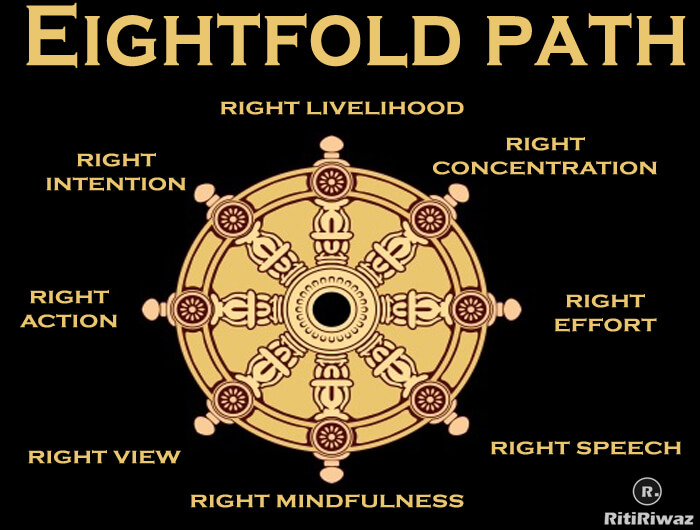The Eightfold Path

Buddhism offers incredibly rich methods to develop our concentration and discriminating awareness, and to lead our lives ethically. The Eightfold Path is a path that develops profound wisdom, pure virtue, and unwavering concentration.
After achieving enlightenment, one of the first teachings of the Buddha was what he referred to as the Noble Eightfold Path or the Wheel of Dharma. The Buddha advised His followers to follow this Path to avoid the extremes of sensual pleasures and self-mortification.
The Eightfold Path is the path to be developed leading to lasting peace and happiness. It is the fourth of The Four Noble Truths. The Eightfold Path is the framework for Dhamma practice. All eight factors are to be integrated into the life of a practitioner of the Dhamma. Each factor contributes to a cohesive system of developing insight and understanding of impermanence and the distraction of stress.
Every Buddhist is encouraged to mold his life according to the Noble Eightfold Path as taught by the Buddha. He who adjusts his life according to this noble way of living will be free from miseries and calamities both in this lifetime and hereafter. He will also be able to develop his mind by restraining evil and observing morality.
The Eightfold Path is a path of Heightened Wisdom, Heightened Virtue, and Heightened Concentration. The path represents the teachings and practices that will lead to this one central core, or enlightenment, and therefore the end to suffering.
These 8 central teachings are as follows:
- Wise View: insight into the true nature of reality.
- Wise Intention: cultivating renunciation, goodwill, and harmlessness.
- Wise Speech: using speech compassionately. We must speak to every living being with respect and trust, regardless of their position or current state.
- Wise Action: ethical conduct, manifesting compassion. Our behavior should stand as a mirror to our character and our intentions must match our actions.
- Wise Livelihood: making a living through ethical and nonharmful means. We must not engage in activities that do not benefit the greater good of society.
- Wise Effort: cultivating wholesome qualities, releasing unwholesome qualities. Bad qualities should be abandoned and prevented from arising again; Good qualities should be enacted and nurtured.
- Wise Mindfulness: whole body-and-mind awareness. It is the focusing of one’s attention on one’s body, feelings, thoughts, and consciousness in such a way as to overcome craving, hatred, and ignorance.
- Wise Concentration: through meditation practice, seeing deeply into the nature of reality, with stability of mind-heart. We must try to put our full attention on only one thing at a time, paying undivided attention to everything we do.
The purpose of practicing The Eightfold Path is to experience the cessation of the distraction of stress. Stress describes the ongoing mental/physical states experienced by your ego-self in the phenomenal world. Stress ranges in experience from general unsatisfactoriness and disappointment to extreme emotional and physical suffering.
It is said that if one follows these eight noble truths we may learn the way to enlightenment just as the Buddha once did. By doing so we have a chance at everlasting and complete happiness.
“However many holy words you read, however many you speak, what good will they do you if you do not act on them?” Buddha
Suggested Read: Buddhist Festival






